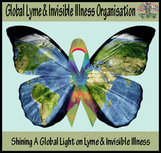Mission Statement
Worldwide Patients are raising awareness and protesting to highlight the need for:
1. Recognition that Lyme disease/borreliosis, and other tick-borne infections, such as Babesia, Bartonella, Rickettsia, Ehrlichia, are serious, and sometimes fatal illnesses.
2. Awareness of the fact that the transmission of tick-borne pathogens, such as borrelia, babesia, rickettsia, via blood transfusion is of global concern.
3. Agreement that Lyme disease/borreliosis should be listed as a notifiable infection. Notifiable status will aid in ensuring that the incidence and spread of this disease are monitored, a necessary precursor to determining the human suffering and socioeconomic impact of the disease.
4. Education of the healthcare sector regarding the accurate diagnosis of Lyme, which in some cases may be limited to clinical presentation due to limitations of serological testing.
*Education should ensure all doctors are familiar with the CDC caution pertaining to criteria for blood tests for Lyme: “This surveillance case definition was developed for national reporting of Lyme disease; it is NOT appropriate for clinical diagnosis...Surveillance case definitions are created for the purpose of standardization, not patient care.”
* Education that Lyme should be included as a differential diagnosis when considering other illnesses that are also reliant on subjective clinical presentation, or have no known cause. This includes, but is not limited to: Motor Neurone Disease (MND) also known as Lou Gehrig’s disease or Amyotrophic lateral sclerosis (ALS) ; Multiple Sclerosis ; Alzheimer’s; Parkinson’s disease; Sarcoidosis.
5. Education of the healthcare sector regarding affordable and effective treatment of both acute and chronic Lyme and other tick-borne infections. This includes the need to update the outdated treatment guidelines of the Infectious Diseases Society of America (IDSA) and to take into account the treatment methods of other Societies such as: The International Lyme and Associated Diseases Society (ILADS) and the German Borreliosis Society (Deutsche Borreliose-Gesellschaft : DBG)
6. Funding for research into tick-borne diseases. Including: Funding for medical research into accurate Lyme testing and treatment ; Funding for research into vectors and reservoir hosts to determine what diseases they may carry and transmit.
1. Recognition that Lyme disease/borreliosis, and other tick-borne infections, such as Babesia, Bartonella, Rickettsia, Ehrlichia, are serious, and sometimes fatal illnesses.
2. Awareness of the fact that the transmission of tick-borne pathogens, such as borrelia, babesia, rickettsia, via blood transfusion is of global concern.
3. Agreement that Lyme disease/borreliosis should be listed as a notifiable infection. Notifiable status will aid in ensuring that the incidence and spread of this disease are monitored, a necessary precursor to determining the human suffering and socioeconomic impact of the disease.
4. Education of the healthcare sector regarding the accurate diagnosis of Lyme, which in some cases may be limited to clinical presentation due to limitations of serological testing.
*Education should ensure all doctors are familiar with the CDC caution pertaining to criteria for blood tests for Lyme: “This surveillance case definition was developed for national reporting of Lyme disease; it is NOT appropriate for clinical diagnosis...Surveillance case definitions are created for the purpose of standardization, not patient care.”
* Education that Lyme should be included as a differential diagnosis when considering other illnesses that are also reliant on subjective clinical presentation, or have no known cause. This includes, but is not limited to: Motor Neurone Disease (MND) also known as Lou Gehrig’s disease or Amyotrophic lateral sclerosis (ALS) ; Multiple Sclerosis ; Alzheimer’s; Parkinson’s disease; Sarcoidosis.
5. Education of the healthcare sector regarding affordable and effective treatment of both acute and chronic Lyme and other tick-borne infections. This includes the need to update the outdated treatment guidelines of the Infectious Diseases Society of America (IDSA) and to take into account the treatment methods of other Societies such as: The International Lyme and Associated Diseases Society (ILADS) and the German Borreliosis Society (Deutsche Borreliose-Gesellschaft : DBG)
6. Funding for research into tick-borne diseases. Including: Funding for medical research into accurate Lyme testing and treatment ; Funding for research into vectors and reservoir hosts to determine what diseases they may carry and transmit.
